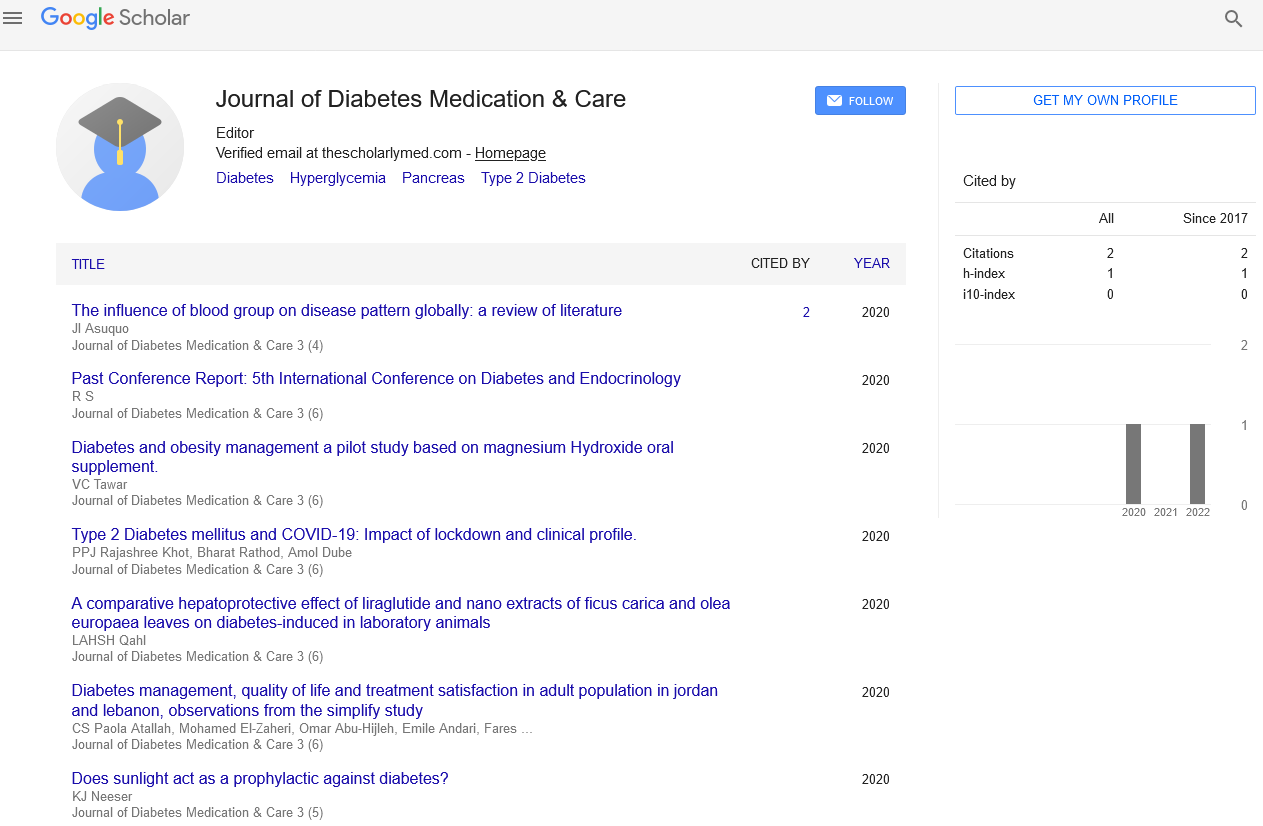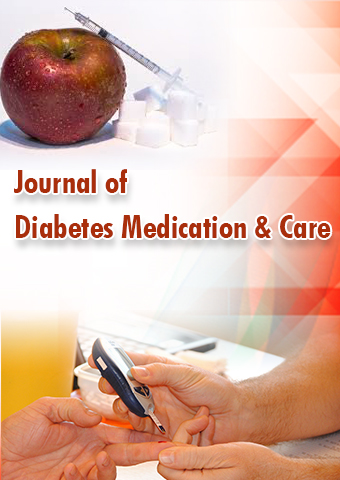Perspective - Journal of Diabetes Medication & Care (2024) Volume 7, Issue 4
Harnessing Brain Proteins for Enhanced Diabetes and Weight-Loss Drugs
- Corresponding Author:
- Manos Bewaka
Department of Genetics, University of Alberta, Alberta, Canada
E-mail: manos.bewaka@med.lu.se
Received: 16-Jul-2024, Manuscript No. JDMC-24-142100; Editor assigned: 18-Jul-2024, PreQC No. JDMC-24-142100 (PQ); Reviewed: 01-Aug-2024, QC No. JDMC-24-142100; Revised: 08-Aug-2024, Manuscript No. JDMC-24-142100 (R); Published: 16-Aug-2024, DOI: 10.37532/JDMC.2024.7(4).248-249
Introduction
In the realm of biomedical research, the intersection of neuroscience and metabolic disorders has yielded promising insights into potential therapies for conditions like diabetes and obesity. Central to these advancements are brain proteins-key molecules that regulate appetite, metabolism, and energy expenditure. This article explores the burgeoning field of harnessing brain proteins for developing enhanced drugs targeting diabetes and weight loss, shedding light on recent discoveries, challenges, and future prospects.
Description
Understanding brain proteins: Gatekeepers of metabolic health
The brain plays a pivotal role in regulating energy balance and metabolic functions through intricate signalling pathways mediated by specific proteins. These brain proteins act as sensors, responding to hormonal cues and nutrient availability to orchestrate physiological responses that maintain metabolic homeostasis.
One such protein garnering significant attention is leptin, often referred to as the “satiety hormone.” Produced by adipose tissue, leptin acts on receptors in the hypothalamus-the brain region crucial for appetite control-to suppress hunger and increase energy expenditure. Dysfunction in leptin signalling has been implicated in obesity, where individuals often exhibit leptin resistance, rendering them insensitive to its appetite-suppressing effects.
Conversely, another key player, ghrelin, dubbed the “hunger hormone,” stimulates appetite and promotes food intake through interactions with receptors in the hypothalamus. Ghrelin levels rise during fasting and decline after meals, signalling hunger and influencing energy balance.
Leveraging brain proteins for diabetes management
The intricate interplay between brain proteins and metabolic disorders extends beyond obesity to include diabetes mellitus, a chronic condition characterized by impaired insulin production or sensitivity. Emerging evidence suggests that brain proteins implicated in appetite regulation also modulate glucose metabolism and insulin sensitivity.
For instance, leptin influences glucose homeostasis by enhancing insulin sensitivity in peripheral tissues such as skeletal muscle and liver. Conversely, disruptions in leptin signalling, as seen in leptindeficient mice or humans with congenital leptin deficiency, can lead to severe insulin resistance and diabetes. This dual role of leptin highlights its potential as a therapeutic target for improving both weight management and glycemic control in individuals with diabetes.
Moreover, recent studies have uncovered novel interactions between ghrelin signalling and glucose metabolism. Ghrelin receptors are expressed in pancreatic beta cells-the insulin-secreting cells-and ghrelin administration has been shown to enhance insulin secretion in response to glucose. This finding underscores ghrelin’s dual role in regulating both appetite and insulin secretion, suggesting its therapeutic potential in diabetes management.
Innovative approaches in drug development
Harnessing brain proteins for enhanced diabetes and weight-loss drugs involves innovative approaches in drug development, targeting specific receptors or modulating protein signalling pathways to achieve therapeutic outcomes. One promising strategy is the development of selective agonists or antagonists that mimic or block the actions of key brain proteins involved in metabolic regulation.
For example, several pharmaceutical companies are actively pursuing leptin analogs designed to overcome leptin resistance and enhance its efficacy in promoting weight loss and improving insulin sensitivity. By fine-tuning the molecular structure of leptin analogs, researchers aim to optimize receptor binding affinity and pharmacokinetic properties to achieve sustained therapeutic effects.
Similarly, efforts are underway to develop ghrelin receptor antagonists that inhibit ghrelin signalling and reduce appetite, offering a potential treatment option for obesity and related metabolic disorders. These antagonists may also hold promise in mitigating hyperinsulinemia and insulin resistance by modulating ghrelin-mediated effects on insulin secretion and glucose metabolism.
Challenges in targeting brain proteins
Despite the promise of targeting brain proteins for metabolic disorders, several challenges hinder the translation of these discoveries into clinical therapies. One major obstacle is the blood-brain barrier, a selective membrane that restricts the passage of molecules from the bloodstream into the brain. Developing drugs that can penetrate the blood-brain barrier to exert therapeutic effects on central nervous system targets remains a formidable task requiring innovative drug delivery strategies.
Moreover, the complexity of brain protein signalling pathways and their interactions with other physiological systems necessitates a comprehensive understanding of their roles in health and disease. Identifying safe and effective therapeutic targets within these intricate networks requires rigorous preclinical research and validation in diverse experimental models, including animal studies and human clinical trials.
Furthermore, individual variability in brain protein expression and responsiveness presents another challenge in personalized medicine. Genetic, epigenetic, and environmental factors can influence an individual’s response to pharmacological interventions targeting brain proteins, highlighting the need for tailored treatment approaches based on biomarker profiling and genetic screening.
Future directions and clinical applications
Looking ahead, ongoing research efforts aim to unravel the full therapeutic potential of brain proteins in managing metabolic disorders and refining treatment strategies. Advances in molecular biology, neurobiology, and pharmacology continue to illuminate novel targets and signalling pathways involved in appetite regulation, energy metabolism, and glucose homeostasis.
One promising avenue involves the development of combination therapies that target multiple brain proteins or synergistically modulate metabolic pathways to achieve additive or synergistic effects on weight loss and glycemic control. For example, dual-acting drugs that simultaneously enhance leptin sensitivity and inhibit ghrelin signalling may offer a multifaceted approach to combating obesity and improving insulin sensitivity in individuals with diabetes.
Moreover, advancements in precision medicine and biomarker discovery hold potential for identifying subpopulations most likely to benefit from specific brain protein targeted therapies. By integrating genetic profiling, metabolic phenotyping, and clinical data, clinicians can tailor treatment regimens to optimize therapeutic outcomes and minimize adverse effects.
Conclusion
In conclusion, harnessing brain proteins for enhanced diabetes and weight-loss drugs represents a promising frontier in biomedical research. From unravelling the intricate roles of leptin and ghrelin in appetite regulation and metabolic health to developing innovative pharmacological strategies that target these brain proteins, researchers are forging new paths toward more effective therapies for obesity and diabetes.
As our understanding of brain protein signalling continues to evolve, so too does the potential to transform the landscape of metabolic medicine. By leveraging insights from neuroscience and metabolic biology, we can envision a future where personalized therapies harness the power of brain proteins to improve health outcomes and enhance quality of life for individuals affected by metabolic disorders worldwide.

